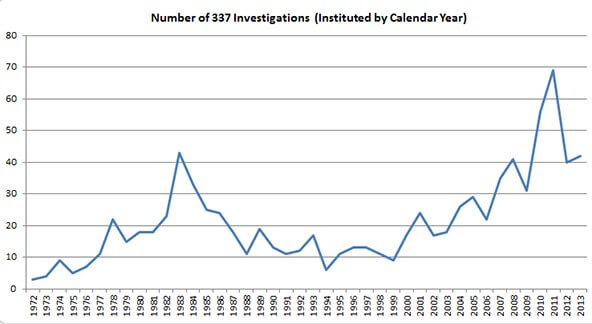What do barcode readers, pool enclosures, televisions and backpack chairs all have in common? Each of these products has been investigated by a federal agency for unlawful importation into the United States. The unlawful part? They’ve all been charged with intellectual property infringement.
Section 337 and the ITC
The agency responsible for IP-based import investigations in the U.S. is the International Trade Commission (ITC). The piece of legislation that this agency deals with most often is Section 337 of Title 19. Section 337 prohibits the importation or sale of imported articles that infringe a valid and enforceable U.S. patent, trademark or copyright.
According to records maintained by the ITC, the amount of Section 337 investigations launched each year has been on the rise for the past 50 years:
- Before 1977 = less than 10 investigations launched per year
- 1978 = 22 investigations launched
- 1983 = 43 investigations launched
- 2011 = 69 investigations launched (record high)

In 2015, the most popular type of ITC investigation involved computer and telecommunications products. These products accounted for over a quarter (27%) of that year’s Section 337 investigations – the same amount as the next three product categories combined!
Opening an investigation
Nearly 90% of Section 337 investigations involve international patent infringement disputes. If a U.S. patent owner feels that a Section 337 violation has occurred, they can file a complaint with the ITC. The complaint will be reviewed by the ITC’s Office of Unfair Import Investigations (OUII), which will decide whether or not to launch an investigation. If an investigation is initiated, the ITC will publish a Notice of Investigation in the Federal Register.
Approximately 45% of Section 337 cases go to trial. These patent litigation trials typically take around 18 months to resolve and include the full range of court actions, including formal discovery, pretrial hearings and motions, trial by an Administrative Law Judge (no jury), post-trial briefs, Judge’s decision, ITC decision, and appeals.
Language challenges in ITC litigation
In ITC litigation, there is the additional challenge of working with one or more international parties. Discovery, in particular, can become a very complex and time-consuming process. For example, there can be hundreds or even thousands of patent documents in one or more foreign languages that require legal translation; depositions can take place all over the world; and everything needs to be translated into English for review by the ITC.
“Litigating in the ITC presents a unique challenge,” says Finnegan, a top IP law firm, because it involves solving “technologically complicated case[s] in a short period of time, in a pressure-packed forum that can make or break the commercial success of the products at issue.” In such an environment, seeking professional translation services to assist with cross-border discovery is no joke.
A language service provider (LSP) can utilize specialized tools and filtering techniques to cull large data sets into more manageable chunks of case-relevant information. Then machine translation (MT) can be used to determine the “gist” of what each document contains, so that it become clear which ones require more accurate human translation by subject matter experts (SME). This process guarantees accurate, high quality and fast translations, which are absolutely critical – anything less could have a serious impact on the outcome of the case.
Results of ITC litigation
Once the ITC Judge has reviewed all case information (with all legal documents translated into English) and heard both sides of the argument, he or she will rule on the case. Then, a Notice of Termination will be published in the Federal Register. If the Judge decides that a Section 337 violation did occur, the ITC can issue one or both of the following remedial orders:
- A cease-and-desist order against named importers – this type of order is enforced by the ITC.
- An exclusion order barring any further importation of the products at issue – this type of order is enforced by U.S. Customs and Border Protection. (You can view the current list of exclusion orders here.)
Importers who do not comply with a remedial order can face fines costing millions of dollars.


